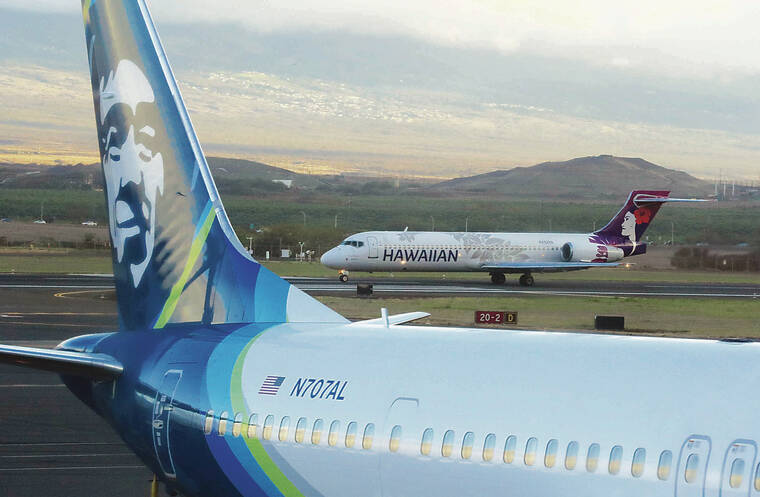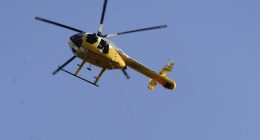
Mahalo for supporting Honolulu Star-Advertiser. Enjoy this free story!
The Hawaiian Airlines name is slated to join a roster of longtime kamaaina brands that lived on after being acquired by companies outside Hawaii.
Well-established local companies in such acquisitions don’t always end up with their legacy surviving. Liberty House is a well-known example of that. But in a lot of cases, new out-of-state owners avoid rebranding kamaaina businesses they buy because it can erode loyalty, be expensive and in some cases remove a valuable connection with a place or culture.
“When a well-established local company, such as Hawaiian Airlines, is acquired by another company, like Alaska Airlines, there are several branding considerations that make changing the name challenging or potentially unwise,” said Brook Gramann, former principal of a Hawaii-based brand strategy company.
Like Hawaiian Airlines, which is being bought by the Seattle-based parent of Alaska Airlines, other kamaaina businesses that kept their brand identities after being acquired by out-of-state entities include First Hawaiian Bank, Outrigger Resorts & Hotels, Times Supermarkets and Love’s Bakery, to name a few.
First Hawaiian, which has local roots going back to 1858 as Bishop & Co. and got its current name in 1969 after several earlier changes, was acquired by giant French bank BNP Paribas in 2001. First Hawaiian remained locally operated and headquartered in Honolulu, and BNP liquidated its stake in the parent of First Hawaiian through public stock sales from 2016 to 2019.
Outrigger was sold to a Denver company in 2016 after being owned by the kamaaina Kelley family for 69 years. The new owner, KSL Capital Partners LLC, committed to “business as usual.”
Times, founded in 1949 by the Teruya family, was sold in 2002 to California-based supermarket operator PAQ Inc. The new owner continued operating 12 Times stores and later acquired five Star Market stores, another kamaaina business, and converted those to the Times brand. PAQ in 2017 sold its 17 Times stores and other Hawaii grocery brands to Japanese-based Don Quijote Co., which has maintained the Times operation.
Love’s perhaps represents the most enduring brand of the select group, after the Honolulu bakery established by Robert A. Love in 1851 continued under mainland and Japanese owners before going out of business in 2021 under local ownership.
For many decades, Love’s was Hawaii’s dominant producer of bread, doughnuts and other baked goods for stores and restaurants.
In 1960, descendants of the bakery’s founder and employees sold the business to mainland giant Continental Baking Co.
Then First Baking Co. of Japan bought Love’s in 1981 and rebranded it as Daiichiya- Love’s Bakery for the next 27 years.
Local management finally took over Love’s in 2008, but ceased operations two years ago under financial strain partly due to the coronavirus pandemic.
Still, the Love’s brand lives on under a license with Oregon-based Franz Family Bakery, which produces bread and other bakery items for Hawaii from some of its mainland facilities under the Love’s name.
“The Love’s brand has a proud and distinguished history in Hawaii and Franz Family Bakery is honored to be given this opportunity to help carry the Love’s tradition forward through this licensing agreement,” the then-president and director of sales for Franz, Kimberly Albers-Nisbet, said when announcing the arrangement.
‘Hawaii’s Airline’
Hawaiian Airlines got its start as Inter-Island Airways, founded by veteran Navy pilot Stanley Carmichael Kennedy Sr. in 1929, and with trans-Pacific flight plans became known by its current name in 1941.
But this isn’t the first time the company has had the continued existence of its brand considered.
In December 2001, Hawaiian Airlines and then-rival Aloha Airlines announced plans to merge amid financial pressure partly due to a travel slowdown after the Sept. 11, 2001, terrorist attacks using hijacked jetliners.
A new name for the combined business was to be decided closer to the merger’s expected completion in the first half of 2002, but the deal fell apart in March 2002 over issues that included disagreements between leaders of the two companies, costs and risks.
Aloha, which was founded in 1946, ceased operations in 2008 after being acquired in 2006 mainly by a California billionaire and struggling against upstart interisland carrier go!, established by Arizona-based Mesa Air Group.
About 1,900 employees lost their jobs with Aloha’s shutdown, but that company’s trade name survived as an asset that was sold initially through bankruptcy and later was acquired by the parent company of Hawaiian Airlines as part of a legal settlement.
Now it’s Hawaiian Airlines being bought by a larger out-of-state company, and discussions took place over whether to keep or change the kamaaina company’s long-established brand.
Easy call
Ben Minicucci, CEO of Alaska Airlines, said Dec. 3 in announcing the $1.9 billion acquisition agreement that maintaining two airline brands after the so-called merger is done represents a departure from typical industry practice yet wasn’t a difficult decision because of the unique histories, cultures and customer connections the two carriers have.
“We have a deep and long-held respect for Hawaii and Hawaiian as an airline, an employer and the embodiment of Hawaii’s culture,” he said.
Minicucci, who will be the combined company’s chief executive, also said his team feels a great sense of responsibility to honor the Hawaiian Airlines legacy spanning 94 years, and that the airline has “massive loyalty” and deep respect from Hawaii residents.
“The success or failure of transactions such as this depends on a lot of factors, but one of the most important and elusive is culture,” Minicucci said. “The culture element is so important that we decided early on … that the Hawaiian Airlines brand will remain — not only in name, but also in the distinctive branding that appears on the Hawaiian airplanes, at airports and other locations, and in the experience enjoyed by Hawaiian Airlines passengers, partners, employees and the communities it serves.”
Gramann, the Hawaii brand strategy company veteran, said elements including local and cultural significance of the Hawaiian Airlines brand can be weighed against benefits of absorbing the brand into Alaska Airlines operations, and that other considerations for integration include the cost to replace Hawaiian Airlines branding on planes, airport facilities and other places.
“The cost and effort required for a successful rebranding campaign can be substantial,” she said.
Another thing going for the Hawaiian Airlines brand is that it references its biggest destination, and part of what it is selling.
“Hawaiian Airlines, with its specific geographical reference, has a strong brand identity and recognition tied to its name,” said Gramann, who also co-founded a company using a place name, Lanikai Bath and Body.
Changing a name
Bob Sigall, author of several books about Hawaii company histories, said it’s generally not advisable to change the name of well- established local companies.
One of Sigall’s favorite not-totally-successful examples of doing so is Holiday Mart, a local discount retail chain established in 1964. Japanese retail giant Daiei Inc. bought Holiday Mart out of bankruptcy in 1981, and more than a decade later phased out the Holiday Mart name. Don Quijote bought the Daiei stores in 2006, yet some local shoppers still refer to the stores by the Holiday Mart name.
Sigall regards the conversion of local department store chain Liberty House to Macy’s under a 2001 purchase by the then-parent of Macy’s, Cincinnati-based Federated Department Stores, as a bad move.
“Liberty House was a tradition in Hawaii from 1849, and Federated just kind of wiped that out,” Sigall said. “I think it was a terrible mistake for Federated or Macy’s to get rid of the Liberty House brand, because it had so much goodwill in Hawaii. All that goodwill is worth a lot of money, I would say.”
When the nation’s largest drugstore chain, CVS, bought smaller rival Longs Drugs in 2008, CVS rebranded all the Longs stores in three other states. But not in Hawaii.
Longs was based in California, where it was founded in 1938, but had become something of a hometown institution for kamaaina shoppers.
“Hawaii is a completely different market,” Tom Ryan, then-CEO of CVS, said at the time. “We’re not going in and cookie-cuttering, so to speak.”
With dynamics like this, Sigall said he can see how the decision to maintain the Hawaiian Airlines name was not hard.
The acquisition by Alaska Airlines is pending regulatory approval and is expected to take 12 to 18 months to close. Until then the two airlines will remain separately owned and operated.
Read More: World News | Entertainment News | Celeb News
Star Ads







